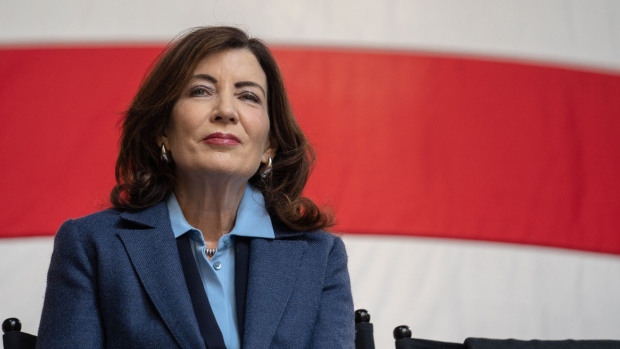Apr 15, 2024
NY Nears Deal for Housing Policy With Tenant Protections, Developer Tax Breaks
, Bloomberg News

(Bloomberg) -- New York lawmakers agreed to the most sweeping changes in New York housing policy in years in a $237 billion budget deal, Governor Kathy Hochul said Monday.
The tentative spending plan — described cautiously by the governor as the “parameters of a conceptual agreement” — includes a tax break for affordable-housing construction alongside new restrictions on evictions and rent increases for market-rate renters. Details of the budget, which was originally due April 1, are subject to change before final approval.
“Taken together, these new measures represent the most comprehensive housing policy our state has seen in three generations,” Hochul said. She said it’s a “landmark” deal that took “weeks and weeks and weeks” to come together.
Soaring rents and upcoming elections are key factors driving state lawmakers to forge an agreement with the Democratic governor one year after she failed to advance a proposal aimed at building 800,000 new homes over a decade.
“We’re glad to see there is a commitment to production,” said Kathryn Wylde, who runs the Partnership for New York City, a business group composed of the city’s largest companies, including JPMorgan Chase & Co. and Goldman Sachs Group Inc. “The shortage of affordable housing is a top priority for the city’s employers.”
The statewide residential vacancy rate was lower in 2022 and 2023 than at any point since the late 1980s, according to the Census Bureau. In New York City, vacancies hit an all-time low of 1.4% in a citywide survey completed in 2023.
Read more: NYC’s Priciest Apartments Hit Lowest Vacancy Since the Mid-90s
In addition to addressing housing, the budget deal includes changes aimed at closing illegal cannabis dispensaries, tightening penalties for assaulting retail workers and providing additional funding for public schools, Hochul said.
State lawmakers could vote on budget bills this week, with an extender passing on Monday to keep the government running before a final agreement gets signed into law.
The legislature last made a significant change in state housing policy in 2019 with a bill that expanded tenant protections in rent-regulated apartments.
In addition to a “good cause” bill that would make it harder to evict tenants, the deal includes a range of proposals aimed at spurring housing construction in New York City and its suburbs in particular. It includes $500 million for the construction of as many as 15,000 units on state-owned sites — an approach Hochul has pursued to build housing after her efforts to override local zoning rules fell short last year.
As details of the deal trickled out prior to the announcement, a group representing landlords assailed the tentative agreement.
“The housing policy disaster being reported out of Albany has done the seemingly impossible: united everyone in outrage,” said a spokesperson for Homeowners for an Affordable New York, which represents landlords. “It is a breathtaking failure to address vital and pressing issues, not a situation where every stakeholder is unhappy, so it must be a good compromise.”
People familiar with the talks say the deal includes the elimination of a state rule preventing New York City from building more densely. It also would allow landlords to raise rents in vacant apartments where landlords make at least $30,000 in improvements.
Top Demand
The tentative deal also includes a new tax break for real estate developers to replace the 421-a program that expired in 2022 — a top demand from Hochul.
James Whelan, president of the Real Estate Board of New York, an influential trade association, blasted the deal as falling short. He said the new exemption program “will produce less rental housing than its predecessor” — 421-a — while “the minor changes to the rules governing rent regulated units will fail to reverse the declining quality of that housing stock.”
The package “must be reassessed in the coming years to put the rental housing market on a solid footing,” Whelan said in a statement.
Read More: NYC Apartment Buildings Are Going On Sale Now for 50% Off
New tenant protections will include giving renters a legal defense against evictions over rent increases of more than 10% or 5% plus the Consumer Price Index, according to the people familiar with the talks, who asked not to be identified. Landlords who own 10 or fewer units would be exempt from that rule.
A key sticking point in the home stretch of the budget talks was a potential carve-out for units priced at 200% or more of the federal fair market rent. That would mean a one-bedroom Manhattan apartment renting for $4,900 would be exempt. Some state lawmakers are pushing for a higher threshold.
It remained unclear Monday evening where the threshold would get set.
“This sham of a housing deal will not address the housing crisis — but it will ensure that the real estate industry keeps getting richer off the backs of hardworking tenants,” Cea Weaver, coalition director at the progressive Housing Justice for All, said in a statement prior to the announcement.
In other issues, localities like New York City will have more authority to shut down illegal marijuana dispensaries under a tentative deal.
Additionally, the city will receive $2.4 billion in assistance to accommodate the ongoing wave of migrants arriving from the US’s southern border.
“It’s the right thing to do for the migrants, and it’s the right thing to do for the city to protect the quality of life for its residents,” Hochul said Monday.
New York City Mayor Eric Adams on Monday praised the package, though the amount for migrants was less than he had sought from the state.
--With assistance from Nacha Cattan, Jennifer Epstein and Laura Nahmias.
(Updates with new statement from Real Estate Board of New York president in 15th paragraph.)
©2024 Bloomberg L.P.







